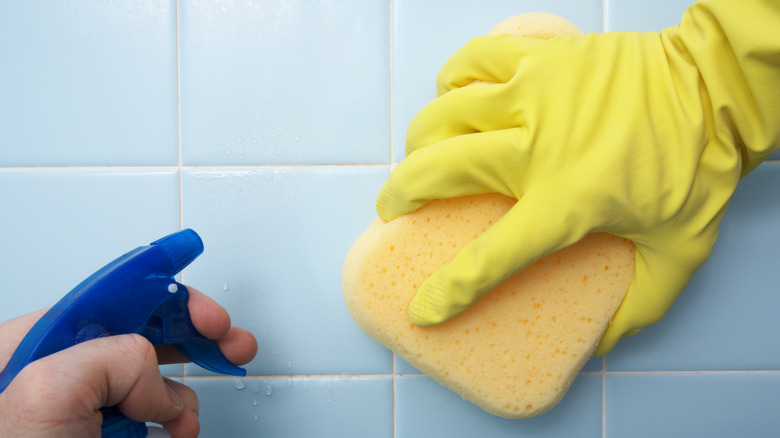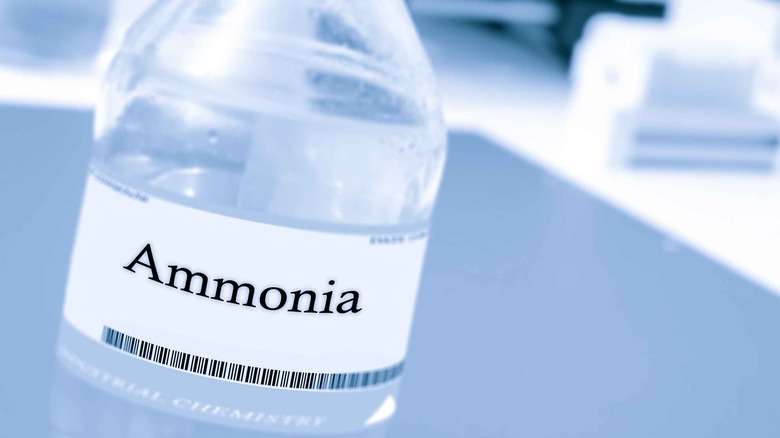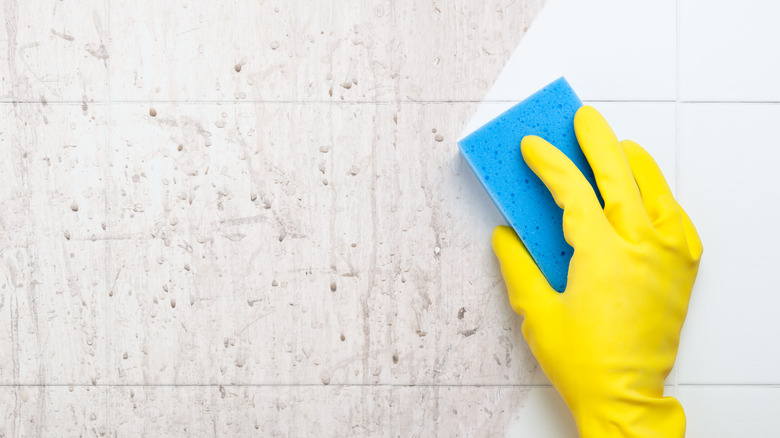Using This Cleaning Ingredient To Restore The Sparkle To Your Tile Is A Mistake
We may receive a commission on purchases made from links.
There's something special about newly installed tile in a shower. The grout is perfectly clean, the tiles sparkle, and the space feels welcoming and fresh. Sadly, once you actually use the shower, the tiles never look the same again. While that's a common concern and completely normal, numerous solutions are available to restore some of that original glow. There are also some pretty risky recommendations that you shouldn't follow. One well-known hack involves the use of ammonia or any product containing ammonia on tile.
Tile and grout will discolor over time. Often, that discoloration is brought on by the buildup of soap residue, mold spores, mildew, and bacteria. It seems logical to reach for a product that you know and trust to clean away that grime, like bleach or ammonia. These products do, in fact, kill bacteria and disinfect surfaces. However, this is problematic for other reasons, including the simple fact that these products will damage both the tile and the grout, stripping away any new-like feel to the space.
Even if you use them cautiously and in a well-ventilated area, they can still cause significant damage to the surface, wearing down the tile itself and eating away at the grout. Ammonia, in particular, is one of the chemicals you shouldn't use on your tile floors, bathroom showers, tubs, or other such surfaces. There are plenty of other solutions that may work better, including a variety of specially designed tile and grout cleaning products.
The damage ammonia may do to your tile
Ammonia is an industrial chemical although some forms of it are produced in nature. What makes ammonia worrisome for cleaning tile is that it has alkaline properties and is a highly corrosive chemical. As a result, it can eat away at surfaces and damage them. While tile may seem very durable, it cannot withstand routine use of ammonia. At first, the ammonia will damage and break down the outer surface of the tile. This exposes the more delicate inner components, which the ammonia will also damage.
Compared to tile and stone, grout is already very porous. The corrosive action of the ammonia will easily break into and eat away at the grout, creating pot marks and ultimately loosening it. This puts the entire tile at risk of breaking off and allows for the backing and walls of the area to become at risk for moisture damage. As a result, ammonia can damage the tile and grout so much that it puts the entire area at risk.
If you've used ammonia on these surfaces prior, you may already see some of that damage occurring. The tile may no longer have a clear, shiny appearance to it. You may also notice small scuffs and damage to the tiles occurring. You may have thought it was just soap residue but this buildup could be due to damage from using any type of corrosive cleaning product on the tile's surface.
How to restore the shine to your tile the proper way
The kicker here is that there are many other cleaning products you shouldn't use on the tile when you want it look brand new. For example, vinegar or lemon-based products can also be problematic if they are highly acidic. Bleach is always a bad idea, even in small amounts, because it acts in the same corrosive manner that ammonia does. You should also avoid using colored cleaners, scouring powders, or steel wool as they can also damage the grout.
With all that in mind, how do you restore the true beauty of tiles? Always start with the least damaging cleaning product. That may include the use of a mild detergent or soap. You could even mix a small amount of baking soda into it to create a more abrasive cleaning agent to help break down the soap residue on the surface of the tile. Rinse well and then shine with a cloth. You can also purchase non-corrosive tile and grout cleaning products.
Some are specifically designed for showers, like Granite Gold. Granite Gold retails for about $11.50 at Home Depot. OBSESS Grout & Tile Cleaner, which is available for around $17 on Amazon, is another option. Don't trust just any product, though. Always read the labels carefully to ensure that they don't contain any type of corrosive agent that could damage your tile. These products make the proper way to clean your tile floors, showers, or bathroom walls easy.


